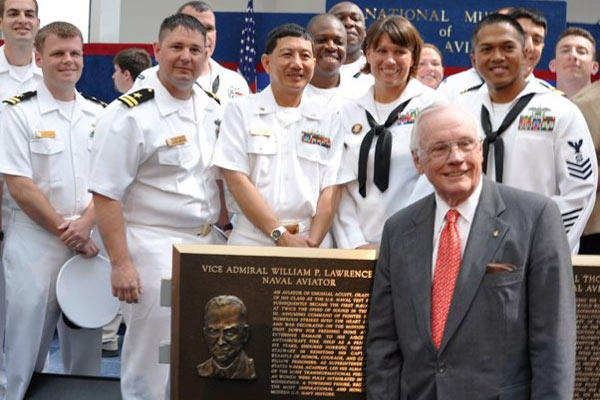Hollywood and novelist James Michener got it backwards about the missions Neil Armstrong flew in Korea, but the man who took "one giant leap for mankind" let it pass.
In 1954, Grace Kelly, William Holden and Mickey Rooney starred in the movie "The Bridges at Toko-Ri," based on Michener's novel of the same name, which the writer loosely-fashioned from his experiences as a journalist aboard the aircraft carriers Essex and Valley Forge during the Korean War.
Armstrong was a lieutenant junior grade flying F9 Panther jets off the Essex when Michener came aboard in late 1951 to report for the Saturday Evening Post on the naval air war and the missions to take out key bridges. Armstrong later recalled the writer's quiet presence.
"He would just sit around the wardroom in the evening or the ready room in daytime and listen to guys tell the actual stories," Armstrong told his biographer James Hansen for the book "First Man: The Life of Neil A. Armstrong."
"He didn't ask questions much or anything. He just kind of absorbed it all," Armstrong said of Michener, but Hansen wrote in the biography that the legendary astronaut claimed the book and the movie had it wrong on how the Navy attacked bridges in Korea.
In the movie, the Panther jets bombed the bridges but in reality, the Panthers could not carry the 2,000 bombs that were used. The jets went in first to attack anti-aircraft positions and the bombing was done by following Douglas A-1 Skyraider prop planes.
Still, Armstrong said "I flew into equally difficult places" as depicted by Michener and "most of the things that happened in the book were actual events. I thought ‘The Bridges at Toko-Ri' was an excellent representation of the kinds of flying we were doing there."
"It was identical, same kind of aircraft and the same class carrier," said Armstrong, who flew 78 combat missions in Korea and had to eject once due to a mechanical failure.
By happenstance, an old "Right Stuff" friend of Armstrong's from the Korean War and the space program was honored in Cleveland on Sunday, the day after Armstrong died at age 82.
John Glenn, who also flew Panther jets as a Marine in Korea, gladly shared with Armstrong the long-planned tribute given to him at the Cleveland Indians-N.Y. Yankees game to mark the 50th anniversary of Glenn's feat as the first American to orbit the Earth.
The 90-year-old Glenn stood on the pitcher's mound and asked the crowd for a moment of silence for Armstrong.
"Neil was a true patriot and American hero," said Glenn, with his wife Annie at his side.
Glenn also admitted to ESPN later that he was envious of his friend Armstrong in getting to be the first on the Moon.
"I told Neil at the time, 'By nature I'm not a jealous man, but in your case I'll make an exception,' " said Glenn, who was also a U.S. Senator from Ohio.
Michener became an admirer of Armstrong and a staunch advocate of NASA and the manned space program.
In 1979, Michener's comments to NASA on the abandonment of the Moon flights presaged Armstrong's own criticism in recent years of the government's decisions to scrap the space shuttles and postpone manned space ventures past low orbit.
"We risk great peril if we kill off this spirit of adventure, for we cannot predict how and in what seemingly unrelated fields it will manifest itself," Michener wrote.
"A nation that loses its forward thrust is in danger, and one of the most effective ways to retain that thrust is to keep exploring possibilities. The sense of exploration is intimately bound up with human resolve, and for a nation to believe that it is still committed to a forward motion is to ensure its continuance."


























